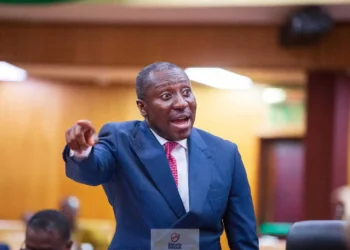Executive secretary of the Chamber of Petroleum Consumers (COPEC), Duncan Amoah, has expressed the need for government and the transport ministry to institute proper structures within the petroleum sector to avert issues on transportation cost.
According to him, once the required structures are put in place, drivers will have no qualms reducing transport fares as the metrics for determining such reductions are in place. He revealed that the impact of this is that the effect of fuel prices going down will commensurate on transport fares.
“There’s a need to put in proper structures so that transportation costs are not in dispute. They may not have to be in dispute because in the petroleum sector, there’s a very efficient way of determining the cost per litre/per kilometer, where you input your operational expense and investment cost and you look at how long it will take to recoup that kind of investment and operational expenses based on the number of liters one is carrying at a time.”
Duncan Amoah
Mr Amoah lamented government’s delay in dealing with the issues associated with increment and decrease in transportation fares, especially where drivers are concerned. He emphasized that stakeholders have over the period proposed an efficient mechanism of determining transport fares to the transport ministry but to no avail.
To this end, the executive secretary of COPEC stated that until government moves to a more scientific way of handling the problem, the public sector transport discourse will linger on.
“The challenge therein even for investment in the transport sector is that, if I were to put in GHC500, 000 today to be able to get a bus that will move people from one point to the other, that investment I put in, if the returns do not add up, I will no longer be interested in investing in that bus…”
Duncan Amoah
Furthermore, Mr Amoah stated that government and relevant stakeholders must get to a very “healthy point” where the public comes to appreciate the cost for moving a kilometer and determining transportation fares.
Concerns of drivers are legitimate
Commenting on the 10% reduction in transport fares effective today, May 17, 2023, which drivers have kicked against citing the expensive nature of spare parts and high cost of living, Mr Amoah revealed that drivers have legitimate concerns to rebel against transport fares reductions.
“The concerns of these drivers are legitimate, they are grounded. You cannot dismiss them outright because all that is being raised is the reality. Fuel prices if I could recollect, since the last time we dropped transport fares, has declined by some 22% between December and now. When we got some 15.3% and now we have been able to scale down to 12.3%. We are doing about 20% to 22% depending on the OMCs you deal with.”
Duncan Amoah
Furthermore, Mr Amoah highlighted that over the period, drivers have had to contend with high cost of spare parts and even tyres which have doubled. Owing to this, he noted that the running cost for drivers will go quite high and their plight will be further compounded by the cost of fuel they need to purchase.
Nonetheless, Mr Amoah urged drivers to reduce transport fares as its impact will gradually and overtime seep to other areas of the economy and reduce cost of food, spare parts and other items of necessity to Ghanaians.
“We need to start with them and it’s unfortunate some of them think that people are always looking to as it were put pressure on them and we don’t regard them; it cannot be true. If there’s any union that has been at the front of championing the concerns of their members, it is GPRTU and other driver unions and I think this is the right call that the national leadership has made. Unfortunately, the pushback is expected, it will come.”
Duncan Amoah























